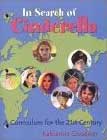
Cinderella:
345 Variants
by Marian
Roalfe Cox
SurLaLune's
Cinderella Area
SurLaLune Fairy Tales Main Page
186
Pitré, Fiabe, Novelle e Racconti popolari Siciliani. Palermo, 1875. vol. i. Story No. XLIII, p. 381. (Told at Palermo by Agatuzza Messia, Dr. Pitré's nurse.)
"PILUSEDDA"
(Little Hairy).
ABSTRACT
Death-bed promise--Deceased wife's ring marriage test--Unnatural father--Enchanter aid-- Counter-tasks--Magic dresses (devil provides them in exchange for father's soul)--Heroine disguise (horse-skin)--Heroine flight--Father deluded by splashing of pigeons in bath, Smashes his head in his rage: devil fetches him--Prince takes disguised heroine to palace; grows fond of strange animal, who gives name "Pilusedda". She asks him for paste to make loaf; puts father's watch in loaf which gets taken to prince. Twice again she puts jewellery in loaves. Prince suspects; invites her to chapel-royal. Heroine breaks (1) walnut, (2) chestnut, (3) filbert, given by enchanter: fairies appear with clothes, jewels, and carriages--Meeting-place (chapel royal)--Threefold flight--Pursuers detained by (1) pearls from her hair, (2) gold and silver. Third time prince drives after her, catches her as she enters palace, and makes her explain--Happy marriage.
TABULATION
(1) A man and woman have a very beautiful daughter. When she is fifteen years old her mother dies alter having given a ring to her husband, and telling him to marry whomsoever it will fit.-- (2) After a time father sends proposals of marriage to many women on condition that they try the ring, which, however, proves too large for some, too small for others. Father determines to wait awhile, since none seems fated to wear ring.-- (3) One day, whilst tidying up, daughter finds ring in the corner of a chest [or in the corner cupboard], puts it on, and cannot get it off again. What shall she do with her father? she thinks. So she wraps a black rag round that finger, and explains to father that she has been scratched. After a few days father insists on unbinding finger, and exclaims she must be his wife.-- (4) Heroine goes to an enchanter (mago), confides all to him, and at his bidding tells father that she must have a wedding-dress of the colour of the sky embroidered in gold and precious stones, with the sun, the moon, and all the planets. Father, wondering where he can find such, goes to the moor and calls the Devil [here called "his cook"] and consults him. "What will you give me for this dress?" "I'll give you my soul." So in half an hour the dress is brought. Heroine, over whelmed, goes to enchanter, who bids her demand a sea-green dress with all the cottages that are in the country (campagna). She tells father this dress is required for the civil contract, the other is for the wedding. Father gets it from the Devil, and heroine now demands eight days' respite. On the eighth day she goes to the enchanter, who bids her ask for a dress, for the day after the wedding,1 of the colour of roses trimmed with four rows of little golden bells. Father procures this from the Devil, then tells daughter that in eight days' time she must really marry him.-- (5) Heroine goes to enchanter, who says: "Take this walnut, this chestnut, and this filbert, and make use of them at your need. Now get a horse-skin, take out the inside (the horse's body), cure the skin, and sew yourself up in it, so that you look like a horse." She does so.-- (6) She prepares her clothes, money, and rings and jewels, belonging to herself and her father, and, the evening of the wedding, tells him she wants to have a bath (for formerly, before marrying, people used to have a bath). To make believe that she is washing, she puts a pigeon in a vessel of water and ties another pigeon to its feet, so that walking about outside it drags the one inside, and they flap and flutter and beat about like a person washing. Heroine meanwhile gets into the horse-skin, and escapes.-- (7) Her father listens. He waits and waits; she never comes out of the bath, he opens the door, and finds nobody. "Treachery!" he shouts, beating his head against the wall, and smashing it. Down comes the Devil and flies away with him.-- (8) Heroine journeys on, and reaches a manor belonging to the prince, where there are all sorts of animals. In the morning the servants ice this curious horse walking with its forelegs in the air, and are about to rip it up as the prince passes and forbids them. He fondles it (and she is pleased), and takes it to the palace, shuts it in a room at the foot of the stairs, and has food brought to it. He asks: "What animal are you?" "I am called Pilusedda." They spend every day together, till the prince's mother cannot tolerate such a thing.-- (9) One day Pilusedda asks prince for a bit of paste, that she may make a small loaf; and he has it brought her. When alone, she mikes a loaf, and puts her father's watch inside; and when prince comes she asks for it to be put in the oven. It is put in with the king's bread, all of which gets burnt; only Pilusedda's comes out beautiful. So her loaf is sent up for the king, and the bakers have nothing at all for Pilusedda. The king finds the watch, and wonders. Next day Pilusedda asks again for paste, makes another loaf, putting in her father's breast-pin, and the prince sends it to the baker's shop. Again all the bread is burnt except this loaf; which is sent to the king, whilst Pilusedda gets the burnt bread. King finds the pin, and wonders; and Pilusedda laments. The third day all happens as before. King finds in Pilusedda's loaf a beautiful ring with a solitary brilliant; then he says, "This Pilusedda cannot be an animal."-- (10) A feast draws near. Prince asks Pilusedda: "Would you like to come to the chapel-royal?" "How can I come?" Prince departs; she breaks the walnut, and sees fairies with clothes, jewels, and carriages. She gets out of skin, dons the rose-coloured dress demanded for the day after marriage, and drives with twelve footmen to the chapel-royal. Prince sees her, and casts his eye up (? is fascinated), and troubles no more about the chapel-royal, he bids his servants discover where the lady lives and inform him. When, on leaving, she becomes aware of the prince's servants, she lets down her hair, whence fall pearls and diamonds. The dazzled servants return to prince and say lady has disappeared. Pilusedda goes to her room, joins nutshells together, and fairies, carriages and all, disappear. Prince returns: "Pilusedda! if you had only come! There was such a beautiful lady!" "What has that to do with me? I want to eat."-- (11) A week afterwards prince tells Pilusedda there is another chapel- royal. She says it is nothing to her; but when he has gone she opens the chestnut. Fairies dress her in the sea-green dress, and she goes to the chapel-royal. Prince fastens his eyes on her, and tells servants they are lost unless they discover where she lives. She throws gold and silver to servants, who make excuses to prince; goes home and closes chestnut, whereupon fairies vanish.-- (12) After some days prince tells her of another chapel-royal. She replies as before; afterwards opens filbert, and fairies dress her in sky- coloured dress. Prince, on seeing her, tells servants to get his carriage ready. When she drives off, he follows, and her carriage goes to the palace. She enters the room, the prince with her. Then he catches her, and makes her explain why she is sometimes a horse.-- (13) Prince sends for king and queen, and tells them he wishes to marry that beautiful girl and they agree to it.
[Note.-- Pitré says the story goes under various names: "Suvaredda" (Little Cork) at Polizzi-Generosa and Cefalu; "Truvaturedda" (Little Inventor) at Capac; "Mmesta di Ligna" (Clad in wood) at Montevago; "Betta Pilusa" (Hairy Bertha) at Ficarazzi; "Cinniredda" (Cinderella) all over Sicily.]
1: The bride wears, on the day
after the wedding only, a different dress from her ordinary one.
Return to place in text.
Cox, Marian Roalfe. Cinderella: Three Hundred and Forty-five Variants of Cinderella, Catskin, and Cap O' Rushes, abstracted and tabulated. London: David Nutt for the Folklore Society, 1893.
While the original text of this book is out of copyright, the special formatting and compilation available on SurLaLune Fairy Tales is copyrighted. Be aware that while the original content has been honored, page numbering, footnote numbering, redesigned charts, links, and other aspects are unique to this site's version of the text. Use at your own risk. For private and fair use educational purposes only.
©Heidi
Anne Heiner, SurLaLune Fairy Tales
E-mail: surlalune@aol.com
Page last updated February 1, 2006
www.surlalunefairytales.com










